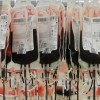Protecting sports players from brain damage
Interview with
What can be done to protect people who are at risk of developing serious damage to their brains? Peter Hamlyn is founder and president of the Brain and Spine Foundation as well as the medical director of Podium Analytics, the youth sports injury charity. Peter is also a brain surgeon and famously saved the life of the boxer, Michael Watson, when he developed a blood clot on his brain in the 1990s.
Peter - The short answer to that is very concerned. The history of it is something I think we should look at. But essentially the problem with the brain is that, although it is full of nerves, it's actually numb. So when it's injured, you feel nothing. That's why we as neurosurgeons can operate on people who are fully awake. And if you are doing that on any other organ, it would be agony. But the brain is entirely numb. So if you hit it inside the skull, it tells you nothing. And yet what you just heard is that it can be injured. And the symptoms, if present at all, can be very difficult to pick up.
Chris - Are some sports going to be more at risk than others? We've dwelled in this program quite heavily on rugby and also football, but are they isolated cases or are pretty much all sports at risk of this happening?
Peter - When this issue first became talked about, it was christened the 'punch drunk syndrome' in a classic paper. And it was pretty clear to people like myself at the time, there was nothing special about boxing or a punch. It was any impact if it was repeated. So it affects just about all sports. So if you look at the ECB, the cricket, they have an entire program now looking at concussion and if you wind back 10 years, people would not be thinking about concussion. So I think to get an idea of how you prevent this or how you'll tackle preventing it, it's worthwhile just looking at that history where we've come from, what the solution will look like and where we are on the journey. And if you like it, it is a bit like trying to cure cancer. We don't know whether we're going to do that next week, whether we're going to do that in a hundred years, but we do have a pretty clear idea of what the answer's going to look like. So at the beginning of this journey, when there were first papers being written by Corsellis, the punch drunk syndrome in the seventies and late eighties, when I got involved, there was a debate about where the concussion was important at all. And I would go to scientific meetings and there would be whole bodies of people as distinguished as myself standing up and saying that actually they didn't think it was, it was a normal physiological response of the brain. You could do this as many times as you'd like and no harm would come. And they almost defined it as such. And that was something that was very difficult to accept for many people, including myself. And if you look at where we are now, everybody knows that repeated head impacts are a problem. We know that head impacts don't cause concussion. What is concussion? Well concussion is the mildest form of head injury that you can diagnose at the side of the pitch. Now, there are other forms of head injury that any idiot could diagnose, but we diagnose concussion with a set of specific questions and tests that look at whether the player is orientated as we call it, in time, place and person. Where are they? What's going on? And that's the mildest symptomatic head impact. But we know that there are problems with head impacts that are not symptomatic.
Chris - What can science throw at this? Or what should we do now because we know we have a problem. We've heard from Alex what currently happens. We've heard from Willie that we don't actually know how much damage it takes or how much energy it takes in an injury and how many injuries it takes to translate into permanent problems. So what do we do in the meantime? How do we go forward from here?
Peter - The eventual answer is going to look something like this. We will have a system whereby we reduce the number of impacts in a career. And I say impacts because it's not the injuries, it's the number of impacts, not the ones that are symptomatic, but all of them. And you do that by focusing on the training, because they do far more training than they do matches. The second thing is that we are going to get much smarter at identifying individuals who are susceptible. As Willie pointed out, not everybody gets affected by the long-term outlook that is long-term effects. And that is very likely to have a genetic substrate to it. We will get better at identifying that, we've started to already. And the third thing is the science and technology behind reducing the impact of any particular collision. And there we have some incredible technology coming on stream. We have some very smart plastics at the moment that, the instant there impacted, turn from a rubbery fluid material a bit like a diving wetsuit into an absolutely rigid structure in an instant. And you can imagine players, instead of wearing the standard rugby head guard, wearing a thing that looks more like a diving suit top that becomes instantly rigid when they collide. So to reduce the whiplash effect of any impact.
Chris - That's encouraging for people who are currently playing the sport because as we always say in medicine prevention is better than cure. But what about people who are in a position where they may have both an amateur or a professional playing career behind them and they're perhaps listening to this thinking, well, is this going to happen to me? Are we in a position to help those people?
Peter - I think it's worthwhile me putting my Brain & Spine foundation hat on here. If you look at the neurological disorders, all patients suffering from neurological disorders are at a distinct disadvantage when compared to people who've got cancer, heart disease or whatever. Neurological disorders are actually more common than either heart disease or cancer put together. But the number of specialists in the UK is incredibly small, so most of them don't have access to specialist care. That's unique to neurology and it's unique to Britain. So looking at how well we are positioned to try and help these people, even with the current treatments we have, we're in a very poor place at the moment, and with that other hat on, that's something we are working on. But if you look at research into neurological issues, there is a phrase - a cure for one is a cure for all. Because once you have sorted out how to cure head injuries, it will be the same therapy that cures stroke, Alzheimer's, all other forms of dementia, multiple sclerosis. we need to crack 'how do you get nerve cells to regrow?' It's called neuroregeneration. And if we crack that, we've solved the problem. It's the equivalent of the cure for cancer, but it's a much bigger problem. More people are disabled by and die from neurological disorders than heart disease, cancer and kidney disease put together.










Comments
Add a comment